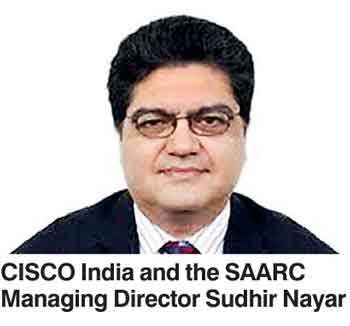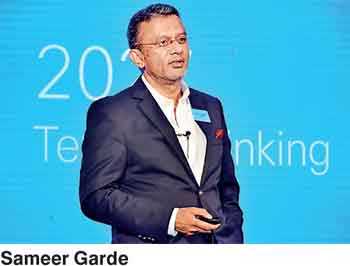Wednesday Feb 18, 2026
Wednesday Feb 18, 2026
Friday, 29 June 2018 00:00 - - {{hitsCtrl.values.hits}}
 By Ashwin Hemmathagama reporting from Goa
By Ashwin Hemmathagama reporting from Goa
Noting the anticipated growth in the global ICT market followed by India’s vision to revolutionise its verticals, Cisco expects Sri Lanka to be the catalyst in regional growth. With a 20% YoY growth in Sri Lanka exclusively for Cisco products, the company looks at increasing market share in the days to come.
The Government digitisation programs are part of the potential that Cisco eyes, according to Cisco India and the SAARC Managing Director Sudhir Nayar. “Sri Lanka is a very important market for us. With the country eyeing to increase its exports, we believe the role Cisco could play is promising. The retail, hospitality, banking and finance, and ICT are few areas we have identified in Sri Lanka. With the upcoming Shangri-La project in Sri Lanka we see many other hotels that needs Cisco presence. On the other hand, the Government looking at digitising its establishments gives the Cisco the potential to expand in Sri Lanka,” he said.
“During the last 12 months we have noticed small and medium businesses coming up very fast. We have added 100 customers from Sri Lanka. They wanted to digitise fast and cater to the global market with their products and services,” he added,
According to Cisco latest initiative in Sri Lanka, the Net Academy, the partnerships with higher educational institutions have started to train students to man the Cisco products and most importantly to cater to the growing ICT requirements in Sri Lanka.
“We give these educational institutions the necessary curriculum and the things that are necessary to train their students. When the students pass-out they possess the practical know as well. Our strong presence in Sri Lanka is beneficial for the community as well as Cisco,” he confirmed, regardless of the presence of the competitors eyeing a piece of the market share.
Cisco empowers firms with network security
 By Ashwin Hemmathagama in Goa
By Ashwin Hemmathagama in Goa
What we considered sci-fi is fast becoming reality, driven by mega shifts in terms of invention and wide use. With Benjamin Franklin finding electricity almost three centuries before, the socio-economic development has increased in leaps and bounds. Riding the waves of innovation and invention, the tech experts who took part in the Cisco India Summit held recently in Goa, predict the digitising era would come to an end with products that would revolutionise the human behaviour.
The personal communication methods that change every 10 years will take the next step by 2027 where texting by human thinking is made possibleand will be the first of a list of predictions that will revolutionise the human behaviour. The conventional employments will also vanish along with their job profiles by 2030 by creating professions that will evolve to match the mega shifts in the society supported by the new era. The average household will be connected with a terabit broadband connection and people will carry a supercomputer in their pockets by 2034 where data consumption of the world would be increased by 1,000 times. Artificial intelligence will become self-aware by 2045 and will play a key role in this revolution opening the demand for reliable hardware and software solution providers such as Cisco.
Harnessing this predicted technological advancement with a potential to be a $6 trillion economy by 2027, India has started its journey for the transformation at scale and speed. According to Cisco Systems (India) Ltd. President – India and SAARC Sameer Garde, India’s internet industry will double to $250 billion before the end of 2021 increasing the contribution to 7.1% to the GDP of India.
“We at Cisco reimagine the future and are getting India ready. Reinvent the network, security, unlock the power of data, embrace a multi-cloud world, and catering to the employee and customer experience are the five identified targets,” he outlined.
“Our researchers, data scientists, and engineers collect information about existing and developing threats. We then deliver protection against attacks and malware. Security is foundational where the attack surface is growing exponentially. 24% of the cyberattacks in India are against the banking and finance industry where 800 million bank accounts are linked to mobiles initiating 1.1 billion digital transactions per month. Increased measuresbased on unmatched visibility, threat research, and analytics block 19.7 billion threats per day in India,” he said identifying the Gold Rush of 1849 that amounted to $200 million getting defeated by the Digital Rush expected to exceed $80 trillion in value.
“India is going to be a $ 6 trillion economy by 2020. In India, this growth will be very high as the data access to citizens is growing at a faster pace, with the New Telecom Policy as it is connecting all gram panchayats in the country with cheap internet connectivity,” he added.